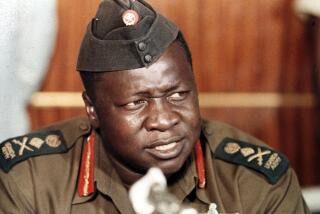Britain’s Mau Mau reckoning
Lately, saving Africa has become very fashionable. Hollywood celebrities are adopting African babies. Bono and Bob Geldof sing for Africa. And Bill Gates, former heads of state Bill Clinton and Tony Blair and a sprinkling of former World Bank officials have probably caused traffic jams there as they tout their campaigns.
Put aside the irony of Clinton doing little for Africa when holding the most powerful office in the world and now, as a private citizen, wanting to save the whole continent. In the “save Africa” caldron, you will find two active ingredients missing: Africans and modern African history.
Africans want former colonial powers to be held accountable for a history of suffering. One example is the lawsuit the Kenya Human Rights Commission plans to file in the British High Court on behalf of the survivors of what came to be known as the Mau Mau rebellion. (The commission is a nonpartisan, nongovernmental organization focused on human rights in Kenya.) The colonial government declared the rebellion a “state of emergency,” and it lasted from 1952 until the rebels’ defeat in 1960.
Kenya had been officially made a British colony in 1920. The rebellion began with the Kikuyu -- the largest ethnic group -- fighting against British rule and British settlers’ land grabbing. Some Kikuyu leaders mobilized fighters against the British through oaths of allegiance (the term “Mau Mau” was coined by the British, likely from the Kikuyu word for oath).
The British response, through the British army, the Royal Air Force and the help of Kenyan collaborators, was brutal, with innocents swept up along with the rebels. The official number of fighters killed was 11,000, but some estimate that tens of thousands more Kenyans died and as many as 1 million -- mostly women, children and elderly men -- were detained.
Because recent authoritarian governments suppressed Mau Mau history and threatened survivors with arrest if they tried to organize, the Mau Mau movement was not legally recognized in Kenya until 2003.
The lawsuit, to be filed in February, will now seek justice, alleging that from 1952 to 1960, the Kenyan colonial government killed and tortured Mau Mau detainees. A background document I obtained from the Kenya Human Rights Commission argues that because the injuries “were sustained in the detention camps of the Kenya colonial government” operating under the mandate of the British, it follows that the British government is liable. Further, it claims the British did not do enough to prevent the torture and abuse.
In her Pulitzer Prize-winning book, “Imperial Reckoning: The Untold Story of Britain’s Gulag in Kenya,” historian Caroline Elkins estimates that more than 100,000 people died in the detention camps in the process of “re-education.” Thousands of others were shot in combat, hanged or killed as collateral damage, and the majority of the Kikuyu people were interned.
The lawsuit raises several questions: Can and should one generation be held accountable for another’s atrocities? Should citizens be held accountable -- through the taxes they pay -- for the atrocities committed by their governments? Should corporations and banks be held accountable for profits gained through past actions that hurt others?
Historical precedence answers in the affirmative. For example, Germany and Austria have paid billions of dollars to the Israeli government and individual Holocaust survivors for World War II atrocities.
But there is also a compelling moral argument for Mau Mau reparations. Philosophers have argued that, as moral beings, we have three sets of duties: helping those in need, doing no harm and alleviating problems inherited from the past to prevent further harm in the future.
We, the living, become accountable for the past, for the sake of the future.
For a British citizen, the wealth created by colonialism (not to mention slavery) is the foundation of today’s well-being in much the same way that the poverty created by colonialism is the foundation of the infamous Nairobi slums. Poverty and wealth can both be inherited.
If a society continues to gain from a past atrocity, doesn’t it have a duty to the children of the victims?
Forgiveness, justice and healing are closely related. In the Truth and Reconciliation Commission of South Africa, the perpetrator of the crime had to own up to the wrongs of the past, then ask for forgiveness.
But the perpetrators also should give back (a step missing in the South African commission), in one form or another, what they took from the victims.
The whole truth, an apology and a tangible gesture of righting the wrong would go a long way in making this living history truly a thing of the past.
More to Read
Sign up for Essential California
The most important California stories and recommendations in your inbox every morning.
You may occasionally receive promotional content from the Los Angeles Times.









